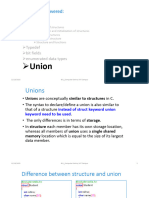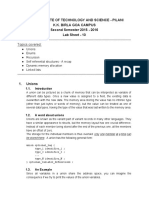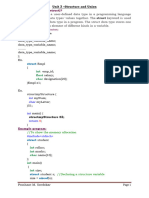0% found this document useful (0 votes)
14 views11 pagesUnions in C Language
Unions in C are user-defined data types that allow different data types to be stored in the same memory location, providing memory efficiency by using only one member at a time. Unlike structures, unions share the same memory space for all members, and their size is determined by the largest member. However, unions have limitations such as only allowing one active member at a time and potential data integrity issues when overwriting members.
Uploaded by
Hargun Kaur GroverCopyright
© © All Rights Reserved
We take content rights seriously. If you suspect this is your content, claim it here.
Available Formats
Download as PDF, TXT or read online on Scribd
0% found this document useful (0 votes)
14 views11 pagesUnions in C Language
Unions in C are user-defined data types that allow different data types to be stored in the same memory location, providing memory efficiency by using only one member at a time. Unlike structures, unions share the same memory space for all members, and their size is determined by the largest member. However, unions have limitations such as only allowing one active member at a time and potential data integrity issues when overwriting members.
Uploaded by
Hargun Kaur GroverCopyright
© © All Rights Reserved
We take content rights seriously. If you suspect this is your content, claim it here.
Available Formats
Download as PDF, TXT or read online on Scribd
/ 11





























































